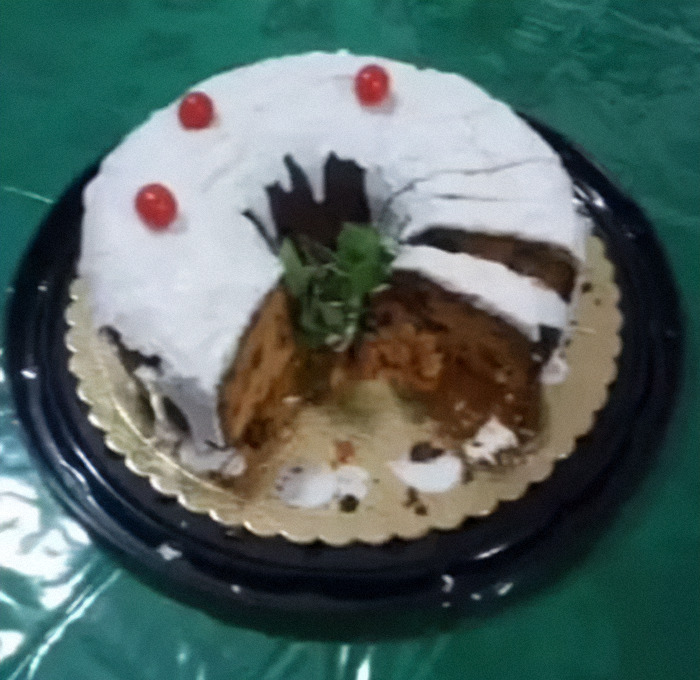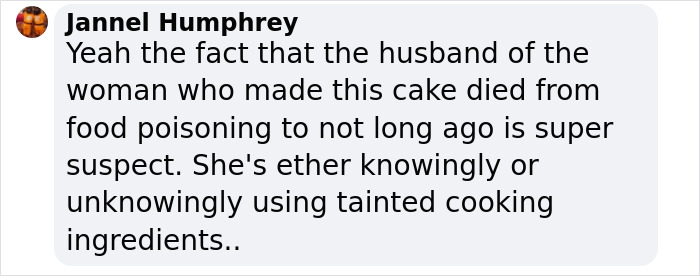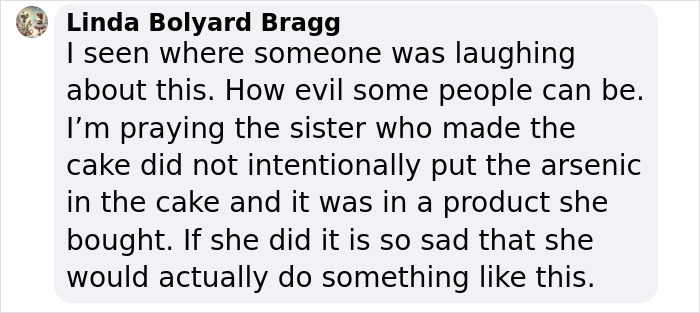
Christmas Cake Poisoning Mystery Deepens With New Fridge Power Cut Theory: “Plain Horrifying”
What should’ve been a festive occasion turned into a nightmare for Zeli dos Anjos, a Brazilian woman who inadvertently caused the passing of three family members after they were poisoned by a Christmas cake she made and served on December 23.
Zeli and five other family members, including a 10-year-old, were hospitalized after the horrific incident. Her two sisters, 58-year-old Maida, and 65-year-old Neuza, as well as her 43-year-old niece, Tatiana, passed away.
- A Brazilian woman accidentally caused the passing of three family members due to poisoning from a Christmas cake.
- Authorities have ruled out intentional poisoning, noting the woman also fell ill from the cake and her family's support for her innocence.
- Investigators are puzzled by the presence of arsenic, as it's typically not produced by spoiled food but can contaminate through various sources.
- Zeli remains under hospital observation, with authorities conducting tests on the cake and gathering evidence from the crime scene.
Toxicology reports revealed traces of arsenic in the bodies of the victims, though authorities say further tests are still needed.
“Based on the evidence we have so far, we cannot determine if the poisoning was accidental or deliberate,” said Marcos Veloso, the police chief in charge of the investigation. “Currently, there is no indication of foul play, but additional evidence could alter our findings.”
Brazilian authorities are investigating a woman after her family was fatally poisoned after eating a Christmas cake she had baked
Image credits: Zeli Dos Anjos
61-year-old Zeli dos Anjos prepared a traditional Brazilian cake for her family’s annual gathering at Arroio do Sal, a beautiful seaside town in the southern part of the country.
While authorities have momentarily dismissed the idea that the poisoning was part of a plan by Zeli, they nevertheless pointed out that the incident occurred months after her husband, Paulo Luiz, lost his life to a similar food poisoning event in September.
Image credits: Tatiana Denize
Luiz’s passing had not been considered suspicious at the time, but the police have since decided to exhume his body for a second, more thorough post-mortem examination that could provide clues to the recent event.
A reconstruction of that day’s events points to a refrigerator malfunction due to a power outage as the cause of the poisoning. Zeli had not been at the property for some time, and while she discarded most of the perishable items like meat, she apparently reused some ingredients, such as currants and fruits, for the cake.
Image credits: Neuza Denize
“When Zeli returned to her holiday home, there was a terrible smell from the fridge, and while some food was thrown away, it appears other items were kept,” Veloso explained.
“We are now investigating if the currants and fruits used in the cake could have been contaminated due to this.”
Authorities have temporarily ruled out the possibility that Zeli had poisoned her family willingly, finding several expired items in her house
Image credits: Tatiana Denize
Further discrediting the idea of Zeli having planned the incident was the fact that she ate two slices of the cake first, falling seriously ill before anyone else. Her condition, unlike that of her sisters, is not fatal, and she’s expected to provide testimony for the investigation in the coming days.
Image credits: Polícia Civil RS
The police are continuing to gather evidence, interviewing those who had contact with the family. According to Veloso, the family appeared to live in harmony, and had good relations with their community. “There’s no suggestion of foul play,” he said.
Tributes have been pouring in for the victims, especially Maida, Zeli’s younger sister, who was a beloved school teacher.
Surviving family members have vouched for Zeli’s innocence, but the presence of arsenic in the victim’s bodies still puzzles investigators
Image credits: Paulo Luiz
According to the Food and Drug Administration (FDA), arsenic is not produced by spoiled food, but it can contaminate food through various methods.
These include soil and contaminated water, food processing, packaging, industrial chemicals, and pesticides. Zeli’s refrigerator malfunction, for example, may have caused the metals in her fridge to contaminate her food.
Authorities have seized the poisoned cake for analysis, and inspected the property in Arroio do Sal, finding numerous expired products.
Image credits: Zeli Dos Anjos
Zeli remains under observation in the hospital, where her condition appears to be stable and improving. Maida’s husband, Jefferson, also consumed the cake but suffered minor symptoms, and was able to immediately share his testimony with investigators.
According to Jefferson, no one in the family was under the impression that Zeli intended to harm anyone, believing her innocent.
“I’d be investigating where the ingredients came from.” Netizens also believed in Zeli’s innocence, lamenting the tragic incident
Poll Question
Thanks! Check out the results:
Explore more of these tags
Some regions of Brazil have high levels of arsenic in the water and agricultural products because of contamination from years of mining. I think the food is more likely contaminated by that than anything else, but I don't have much information to go on. I wish the story said what city this took place in.
But they were in a town: others were using the same water supply, and arsenic would have been found in items other than the cake, too, especially since most cakes don't really use water as an ingredient. I just don't see how it can be the water and only affect one cake in an entire town
Load More Replies...Arsenic is a chemical element. There's no way it could have been produced by any mechanism of spoilage. Arsenic was put into that cake, and given that the woman's husband died from the same cause in a different incident, I'd bet money this woman poisoned them all intentionally.
I agree, and the argument that "she ate the cake, too, therefore she can't have intended to poison anyone" is weak at best. Even the argument that she ate 2 slices before anyone else might just have been so a) they'd trust her cake, b) so she was "guaranteed" (according to faulty maths) to have consumed a lethal dose, or c) so she wouldn't be awake/alive to see her family die. I'm very curious about what a post-mortem of her husband will show
Load More Replies...Some regions of Brazil have high levels of arsenic in the water and agricultural products because of contamination from years of mining. I think the food is more likely contaminated by that than anything else, but I don't have much information to go on. I wish the story said what city this took place in.
But they were in a town: others were using the same water supply, and arsenic would have been found in items other than the cake, too, especially since most cakes don't really use water as an ingredient. I just don't see how it can be the water and only affect one cake in an entire town
Load More Replies...Arsenic is a chemical element. There's no way it could have been produced by any mechanism of spoilage. Arsenic was put into that cake, and given that the woman's husband died from the same cause in a different incident, I'd bet money this woman poisoned them all intentionally.
I agree, and the argument that "she ate the cake, too, therefore she can't have intended to poison anyone" is weak at best. Even the argument that she ate 2 slices before anyone else might just have been so a) they'd trust her cake, b) so she was "guaranteed" (according to faulty maths) to have consumed a lethal dose, or c) so she wouldn't be awake/alive to see her family die. I'm very curious about what a post-mortem of her husband will show
Load More Replies...
 Dark Mode
Dark Mode 

 No fees, cancel anytime
No fees, cancel anytime 







































































30
11